Parachutes Over Crete:
Publisher’s Preview
by Mike Bennighof, Ph.D.
April 2024
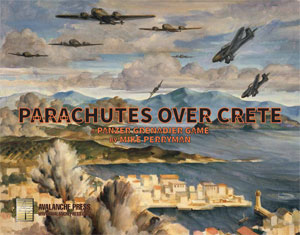 There are 493 playing pieces in Panzer Grenadier: Parachutes Over Crete, and of those, all of two are tanks. Both of those are British, making Parachutes Over Crete an oddity, a Panzer Grenadier game without panzers. There are 493 playing pieces in Panzer Grenadier: Parachutes Over Crete, and of those, all of two are tanks. Both of those are British, making Parachutes Over Crete an oddity, a Panzer Grenadier game without panzers.
Instead, it’s a game of intense infantry fights between elite formations. Parachutes Over Crete is based on the May 1941 German airborne assault on the Greek island of Crete, a long and narrow island dividing the Aegean Sea to the north from the Mediterranean Sea to the south. Allied aircraft based on Crete could, in theory, bomb the vital oilfields in Romania that powered the Axis war machine. Axis aircraft based there could interdict vital Allied shipping routes through the Mediterranean Sea.
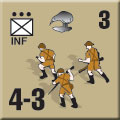 Parachute troops had made airborne landings before, but never on the scale proposed for the German invasion of Crete. The Germans would not have to initially capture the entire island; the invasion would concentrate on the airfields at Maleme and Rethymno, the port at Canea and the airfield at Heraklion. The 7th Airborne Division, reinforced by the four battalions of the independent Air-Landing Assault Regiment, would land by parachute and glider at Maleme and Rethymno in the morning, and then at Rethymno and Heraklion in the afternoon after the transport planes had returned to Greece and re-loaded. Once airfields had been seized, the planes would brin gin the 22nd Air-Landing Division, an Army unit trained and equipped for rapid deployment by aircraft. When that division became tangled in traffic in northern Greece, planners quickly substituted the 5th Mountain Division. Parachute troops had made airborne landings before, but never on the scale proposed for the German invasion of Crete. The Germans would not have to initially capture the entire island; the invasion would concentrate on the airfields at Maleme and Rethymno, the port at Canea and the airfield at Heraklion. The 7th Airborne Division, reinforced by the four battalions of the independent Air-Landing Assault Regiment, would land by parachute and glider at Maleme and Rethymno in the morning, and then at Rethymno and Heraklion in the afternoon after the transport planes had returned to Greece and re-loaded. Once airfields had been seized, the planes would brin gin the 22nd Air-Landing Division, an Army unit trained and equipped for rapid deployment by aircraft. When that division became tangled in traffic in northern Greece, planners quickly substituted the 5th Mountain Division.
The British Empire entrusted the island’s defenses to Maj. Gen. Bernard Freyberg, the commander of 2nd New Zealand Division. Freyberg had – for the first time in the war – the benefit of decoded German communications outlining the invasion plan, and knew that he only had to defend those four objectives. This was a fortunate stroke, since he only had limited forces with which to do this.
 In the game, the British Empire defends the island with Australians and New Zealanders, including the fearsome Maori Battalion. They’re reinforced by the Greek regiments included in each defensive zone; the Greeks lack the firepower of the Empire forces but they’re fighting on their own soil and at times aided by extremely angry Cretan civilians who pour out of the hills to attack the invaders. Their morale is good; their leadership not so much until a battalion of officer cadets joins the fighting. In the game, the British Empire defends the island with Australians and New Zealanders, including the fearsome Maori Battalion. They’re reinforced by the Greek regiments included in each defensive zone; the Greeks lack the firepower of the Empire forces but they’re fighting on their own soil and at times aided by extremely angry Cretan civilians who pour out of the hills to attack the invaders. Their morale is good; their leadership not so much until a battalion of officer cadets joins the fighting.
New Zealand provided the bulk of the fighting power, with all three brigades of 2nd Division on the island. Added to that was one brigade of Australians and another British brigade, plus assorted small units evacuated from Greece. Eight Greek regiments, quickly slapped together from the troops evacuated from the mainland and the depots of the 5th “Crete” Division raised on the island, were attached to the British Empire brigades.
The bad guys bring Germany’s two elite infantry forces onto the island: paratroopers and mountain troops. The 7th Airborne Division is at its best in this operation, with the sort of morale ratings you’d expect from paratroopers at their very best, plus excellent leadership and initiative. Their only real problem is that they have to land by glider or parachute, and even in scenarios taking place in the days after the initial airborne landings they’re not at full strength and sometimes still disorganized, as those initial landings were very rough in the paratroopers.
The 5th Mountain Division is a relatively new formation, formed eight months earlier from a regiment of the 1st Mountain Division and a Bavarian infantry regiment converted to mountain status. It’s likewise well-led, even if its morale isn’t quite as up to the same levels as the paratroopers. But unlike the paratroopers, the mountaineers didn’t have to jump out of airplanes; they arrive by air transport once the airborne has captured Crete’s few airfields, and sometimes by impressed fishing boat. Either way, they show up on the battlefield much better-organized than the Air Force’s army and usually with their heavy weapons (those that can be crammed into a Ju52 transport).
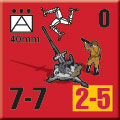 The game follows the invasion and defense plans, dividing the action into segments. The chapters cover the fighting at Maleme Airfield, at Prison Valley just outside Canea, and at Rethymno. We start with a couple of intro scenarios for players new to the game system (so they don’t have to tackle the air-landing procedures right off the bat) and then move into five chapters of action, followed up by two extra scenarios from the Allied retreat that didn’t fit any of the chapters, and a bonus scenario of the German airborne landing at Corinth in mainland Greece, for a total of 39 scenarios and five battle games. The game follows the invasion and defense plans, dividing the action into segments. The chapters cover the fighting at Maleme Airfield, at Prison Valley just outside Canea, and at Rethymno. We start with a couple of intro scenarios for players new to the game system (so they don’t have to tackle the air-landing procedures right off the bat) and then move into five chapters of action, followed up by two extra scenarios from the Allied retreat that didn’t fit any of the chapters, and a bonus scenario of the German airborne landing at Corinth in mainland Greece, for a total of 39 scenarios and five battle games.
Maleme and Prison Valley (so-called by the New Zealanders because it was dominated by a large white-washed prison) saw the New Zealanders face first the airborne landings and then German efforts to secure their objectives and move on. Even knowing where the Germans are going to land, the defenders have a tough time of it. The Germans are most vulnerable right after they land, as most of their weapons dropped separately in special canisters. While some popular histories of the campaign make a great deal over this (and it was a serious flaw in German procedure), New Zealand after-action reports make it clear that this phase was over very quickly, in game terms less than one turn’s action. The paratroopers either recovered their weapons and got them into action, or they failed to do so and they died. At this scale (platoon-level) there were no mobs of pistol-armed paratroopers roaming the battlefield.
During that first turn, the Germans are fantastically vulnerable and will inevitably take heavy losses. It’s then up to the German player to rally his or her survivors and get them into action. Even after heavy losses, a German parachute battalion is a formidable light-infantry force, and the defenders don’t have many more heavy weapons than the invaders.
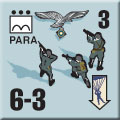 Only a handful of scenarios have tanks, British Matilda heavy tanks and Mark VI light tanks. The Germans do have some 37mm anti-tank guns, which are hell on the Mark VI but won’t do much to the Matilda. They’ll have to assault them hand-to-turret, and with that soaring airborne morale on the German side the British tankers will have to be very careful. Instead, it’s a battle of tough infantry formations. The Australians are just as tough as the New Zealanders; the German mountaineers are almost as tough as the paratroopers. Only a handful of scenarios have tanks, British Matilda heavy tanks and Mark VI light tanks. The Germans do have some 37mm anti-tank guns, which are hell on the Mark VI but won’t do much to the Matilda. They’ll have to assault them hand-to-turret, and with that soaring airborne morale on the German side the British tankers will have to be very careful. Instead, it’s a battle of tough infantry formations. The Australians are just as tough as the New Zealanders; the German mountaineers are almost as tough as the paratroopers.
I designed the infantry game as the core of Panzer Grenadier; I’d played the ancient Panzerblitz as a 12-year-old and even then, I knew that something was wrong. Infantry was an afterthought, a speed bump to be run over by the panzers. I wanted the infantry in Panzer Grenadier to take on its actual role, and to be able to carry a game all on its own. Parachutes Over Crete does that.
You can order Parachutes Over Crete right here.
Add More Fun!
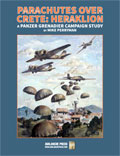 Parachutes Over Crete: Heraklion Parachutes Over Crete: Heraklion
A set of nine scenarios, plus historical background and three battle games, drawn from the May 1941 German airborne assault on Herkalion, capital of Crete, defended by the British 14th Brigade and determined Greeks. Requires Parachutes Over Crete and Road to Dunkirk.
You can order Heraklion right here.
Parachutes Package
Parachutes Over Crete
Road to Dunkirk
Heraklion
Retail Price: $192.97
Package Price: $155
Gold Club Price: $124
You can experience the Parachutes Package right here.
Sign up for our newsletter right here. Your info will never be sold or transferred; we'll just use it to update you on new games and new offers.
Mike Bennighof is president of Avalanche Press and holds a doctorate in history from Emory University. A Fulbright Scholar and NASA Journalist in Space finalist, he has published a great many books, games and articles on historical subjects; people are saying that some of them are actually good.
He lives in Birmingham, Alabama with his wife and three children. He misses his Iron Dog, Leopold. Leopold was not parachute-deployable.
Want to keep Daily Content free of third-party ads? You can send us some love (and cash) through this link right here.
|
